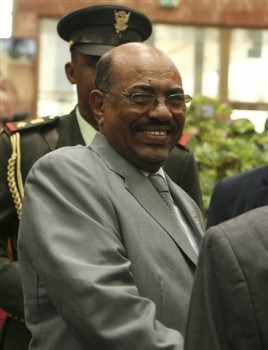AU FM’s endorse draft preventing arrest of Sudan’s Bashir in Africa
July 2, 2009 (WASHINGTON) — The African Union (AU) foreign ministers voted on late Thursday night, in favor of a draft resolution calling on the African members of the International Criminal Court (ICC) not to execute an outstanding arrest warrant for Sudanese president Omer Hassan Al-Bashir.

The direction of the draft resolution was reportedly resisted by some African countries including Ghana, Chad and Botswana.
The Ghanaian foreign minister Mohammed Mumuni told reporters that his government does not share the position of Libya.
“Certainly that’s not the position that we take…for us in Ghana there is absolutely no equivocation at all about our acceptance and respect for the jurisdiction, the integrity and high honor of dignity of the ICC,” Mumuni said.
However, the Ghanaian top diplomat called on the UN Security Council (UNSC) to suspend the “ill timed” arrest warrant under Article 16 of the Rome Statute.
The summit in Libya was marked by chaos and sharp disagreements over proposals pushed by the host on creating a central AU authority with powers over foreign affairs, economy and defense.
Several heavyweight countries in the continent including South Africa and Nigeria voiced opposition to the proposal. The debate over the issue got heated and diplomats said that Gaddafi stormed out of the meeting twice in anger.
The draft on the ICC was circulated by Libya to the surprise of many delegations and discussions over the language of the text continued throughout Thursday night.
The original text proposed non-cooperation with ICC on “the arrest and surrender of African indicted personalities”. This would be in response to the inaction of the UNSC on the AU request to defer Bashir’s indictment.
Furthermore, it proposed creating an oversight mechanism over the ICC prosecutor and puts the possibility of withdrawing from the court.
But the final version of draft agreed for by the foreign ministers would specify that non-cooperation with the ICC on arresting the Sudanese president rather than any African figure as originally proposed.
“It was adopted,” a senior official in one of the national delegations told Reuters. The resolution still has to be approved by the African leaders in the summit.
It is not clear whether the new text will put to vote or if a consensus will have to reached for it to be adopted.
Last Sunday Gaddafi threatened his African peers that he may force a vote on the single African government that once approved by two-thirds of the leaders “the remaining third must respect the decision of the majority”.
Bashir and several African leaders have left the summit including leaders of Egypt, Senegal, Algeria and Equatorial Guinea and Comoros Island, according to Libyan state agency.
Sudan have expressed confidence that the AU will adopt the draft resolution sponsored by Libya though later a senior Sudanese official accused European countries of seeking to block it.
“We have heard the Europeans are lobbying (against the draft),” Sudanese State Minister for Foreign Affairs Samani al-Wasila told Reuters.
“We ask the Europeans not to interfere. Most of our problems are coming from post-colonial countries”.
The French-Libyan born Counsel Hadi Shalluf speaking to Sudan Tribune by phone from Paris downplayed the significance of the draft text if adopted.
“This [resolution] would simply be inconsistent with the individual legal obligations of these states under the Rome Statute and international conventions. I really think that once these delegations return home they will forget all about it. Nobody can take this seriously,” Shalluf said.
“As I said before I believe that it is African nations which will arrest Bashir and extradite him to The Hague,” he added.
A conference of African ICC state parties held last month in Addis Ababa adjourned without an agreement on withdrawal from the court as pushed for by Libya, Sudan and other states.
For some of these countries withdrawing from the ICC would mean losing millions of dollars in aid from the European Union (EU) as some bilateral agreements link it to ratification of the Rome Statute.
New York-based campaign group Human Rights Watch (HRW) said that if the AU approved the draft resolution, it would mean the 30 African states who have signed up to the ICC would be in violation of their legal obligations.
“Basically this would … give a free pass to Omar al-Bashir to traipse freely around the continent,” Reed Brody, legal counsel for Human Rights Watch, told Reuters
(ST)
